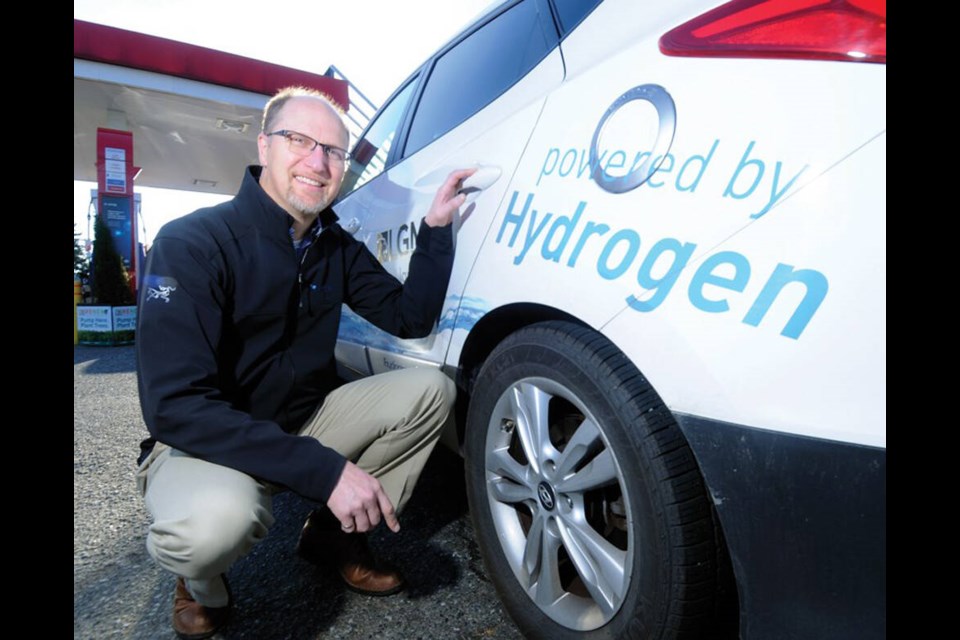North Vancouver will soon be home to the largest clean hydrogen production facility in B.C. following a major purchase on the industrial waterfront.
HTEC, which has operated on the North Shore since 2004, has agreed to purchase the ERCO Worldwide property and sodium chlorate plant at the foot of Forester Street in Maplewood to start capturing 15 tonnes of hydrogen per day.
“It’s very exciting. It’s been something we’ve been working very hard on for quite some time now. I think it’s really huge for the industry,” said Sabina Russell, HTEC vice-president of clean fuels. “When we look at what it’s going to take for Canada to meet our net-zero goals, we think hydrogen is going to play a very important role.”
Russell could not put an exact figure on the size of the deal, which is expected to close in 2023, but said it is “in the hundreds of millions.” The property was last assessed at $96.4 million.
Since the 1950s, the site has been used to produce sodium chlorate, an industrial compound used in bleaching for the paper industry, but that process results in about 15 tonnes of byproduct hydrogen per day, most of which is vented and simply dissipates into the atmosphere. ERCO will leaseback a portion of the property and continue with their operations while HTEC will be installing equipment to capture and purify that otherwise lost energy and prepare it for distribution.
HTEC’s business focuses mainly on the transportation market and supply of hydrogen to B.C.’s sizable fuel cell research and development hub.
Currently, they have pumps at four filling stations in the Lower Mainland, including one at North Vancouver’s Westview Plaza, and one in Kelowna, but there are another 12 on their way in B.C.
“This plant could support deployment of about 30,000 fuel cell cars in the region,” Russell said. “We really feel like it’s such a good news story that we’re using something that’s otherwise wasted to replace diesel and gasoline and help us move to the zero-emission vehicles.”
How green is hydrogen?
Hydrogen is the most abundant element in the universe and it sits right at the top of the periodic table, but it’s mostly found bonded with other compounds.
While the consumption of hydrogen itself produces only water vapour and no carbon emissions, it still takes a tremendous amount of energy to separate and, as a fuel source, it’s only as green as the energy used to capture it.
Most of the hydrogen consumed in B.C. today is imported “grey hydrogen” from California where it is produced by methane methylation. That results in about 160 grams of carbon per megajoule of energy, Russell said. A megajoule is roughly what it would take to move a one-tonne vehicle 160 kilometres per hour.
ERCO’s electrolyzer is powered by BC Hydro’s grid, which is itself mostly hydroelectric, and the hydrogen produced at the HTEC plant will be result less than 30 grams of carbon per megajoule.
“So, it’s considered a very overall low-carbon intensity source of hydrogen,” Russell said. “We don’t want to start making a bunch of dirty hydrogen and using that to power our vehicles.”
Zero-emission vehicle future
Today there are about 200 fuel hydrogen fuel cell vehicles on the road in Metro Vancouver – mostly Toyota Mirais and Hyundai NEXOs. Battery electric vehicles are taking up almost all of the market share for zero-emission vehicles currently, but Russell said they expect to see fuel cells become a more attractive option for consumers as more fuelling stations come online and more fuel cell vehicles from Honda, Toyota, BMW and Hyundai come onto the market in the next couple years.
Russell said they see even greater potential for growth in the light-duty truck and heavy equipment sector, which will be far more difficult to replace with electric alternatives because of the size and weight of the batteries required to operate them.
Is hydrogen safe?
There will be significant regulatory hoops to jump through with the District of North Vancouver, the province and the federal government, but the company hopes to have its new facility online by the end of 2025, Russell said.
Hydrogen, famously, is highly combustible, but the industry is developing safely, Russell said. When fully online, the amount of energy stored as hydrogen on the HTEC site is less than what a typical gas station would have in its underground tanks, Russell said.
“If there’s some crazy stray bullet on a highway that pierces the tank in your vehicle, it is actually safer than if it pierces a gasoline tank,” she said. “If there was a leak, it goes straight up in the air.”
The company expects about 50 people will be employed through design, construction, operation and distribution from the site.
Under Natural Resources Canada’s hydrogen strategy, the federal government envisions hydrogen making up 31 per cent of the energy consumed by users by 2050, with a domestic market alone estimated to be worth $50 billion per year. By 2035, Canada will no longer allow the sale of new internal combustion engine vehicles.



